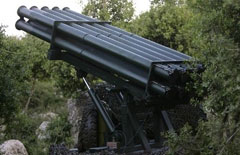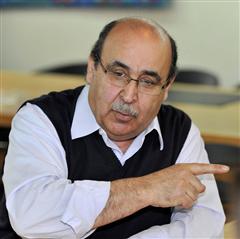
The Resistance at the Core of the State, Complementarity and Strength

Latifa al-Husseini
March 14 forces are blindly pressing ahead with their stanch campaign against the Resistance. Their leaders actually wish for the vanishing of the Resistance, just like freshly expressed by Samir Geagea, who said if only Hizbullah let the people and state be! Do they realize the likely reverberations on the nation if Hizbullah ever answers their wish?

Not only does the Resistance draw rebuke of March 14 camp, but also it annoys them so much that they wish to get rid of it. They constantly skim through alibis to dig flaws in its legitimacy. For instance, they keep replicating that the Resistance falls short of a constitutional text granting it legality, rejecting it as being contradictory to the state, considering the so-called exclusivity of arms.
But the Resistance needs no proof of innocence from the "Cedar Revolution."
Just a swift glance at the Lebanese and foreign history shows the legitimacy of the Resistance and armed struggle to liberate and protect the land from any jeopardy.
The Policy Statement Grants Legitimacy
Too many people ignore or pretend to ignore that the Lebanese National Pact, which was the mainstay to the establishment of the Lebanese state in 1943, was not a written act, until it was first included in the policy statement of the first Lebanese government on October 7, 1943.
In Lebanon, there are neither negative nor positive [citizens] anymore, neither Muslims nor Christians, the Lebanese have rather become one Arab nationalist independent Lebanese person, the ministerial statement quoted a key headline of the National Pact as stating.
The National Pact is founded on the following equation: in order to reach independence, Christians must renounce their demand for a French protection, whereas Muslims, for their part, must renounce their demand to be part of Syria.
Therefore, Lebanon's first government relied on a pseudo verbal agreement between the political poles at the time of independence, a moral document that afterwards inspired the policy statement.
The work of the Resistance in Lebanon can be seen as such, since experience has proven that a written text hereby enforcing and defending the nation was needless. Such a defense is a need but it is also "spontaneous." Facing an aggression needs no permission whatsoever. The goal is to protect Lebanon from attacks and greed.
Besides, the 1989 Taif Agreement, deemed a top reference by all political sides and parties in Lebanon, legitimated the resistance.
Ali Fayy ad, Member of the Loyalty to the Resistance parliamentary bloc, corroborates that the third paragraph of Taif Agreement allowed the recourse to necessary measures to free all the Lebanese territories occupied by "Israel," extend the sovereignty of the state throughout the country, deploy the Lebanese army along the Lebanese borders recognized internationally, work on upholding the presence of international forces in the South to secure "Israeli" withdrawal and pave the way for restoring peace and security, as well as to work on implementing resolution 425 and all the Security Council's resolutions on fully ending the "Israeli" occupation.
ad, Member of the Loyalty to the Resistance parliamentary bloc, corroborates that the third paragraph of Taif Agreement allowed the recourse to necessary measures to free all the Lebanese territories occupied by "Israel," extend the sovereignty of the state throughout the country, deploy the Lebanese army along the Lebanese borders recognized internationally, work on upholding the presence of international forces in the South to secure "Israeli" withdrawal and pave the way for restoring peace and security, as well as to work on implementing resolution 425 and all the Security Council's resolutions on fully ending the "Israeli" occupation.
According to Fayyad, the Resistance is indeed legitimate considering the natural and legal rights and principles allowing citizens to defend themselves in the face of dangers stalking them. "Therefore, any society would be able to defend itself without prior permission once endangered," he stresses.
After Taif Agreement, all the subsequent ministerial statements stated the right of the resistance to liberation and then to defense. However, since 2005, March 14 camp has endeavored to lampoon and underestimate such legalization. But Hizbullah had a different stance.
"The policy statements are an authorization and an official approval from the Lebanese state of the legitimacy of the Resistance," says Fayyad.
He even considers them a green light to the Islamic Resistance at the time, even though it started in the 1980s due to occupation.
The Exclusivity of Arms and the Particularity of Lebanon
In their concerted attack against the Resistance, March 14 forces lambast Hizbullah as torpedoing the exclusivity of arms in the hands of the state solely and as confiscating the peace-or-war decision. But Fayyad explains that the exclusivity of arms is a general legal theoretical concept, while the particularity of Lebanon entails a whole different position. "How could Lebanon defend itself and liberate its lands in the face of ‘Israeli' threats though traditional defense means?" he wonders.
"Lebanon has repeatedly tried, throughout history and decades, to rely on traditional defense means and it has failed in deterring aggressions. There has also been failure when Lebanon reckoned on the international diplomacy to prevent occupation," he maintains.
Resistance throughout History
Looking closely into the experience of the Islamic Resistance, the wide spectrum of other countries' experiences of armed struggle and national defense throughout history comes forward. Journalist and political writer Nasri Sayegh goes down in the annals of time, back in the 19th century, when legislators disagreed over the army supporters. In the time, France refused to consider "the army supporters" as an integrant part of the law since the French army was deemed strong. Germany, for its part, has demanded that "supporters" be part of its already-weak army.
"States with weak armies essentially need supporters and a popular resistance," Sayegh argues. It is then a matter of power balances rather than legal affairs.

Both Fayyad and Sayegh agree that nations and armies, when menaced, resorted to popular mobilization to back the national army.
Besides Europe, resistance movements, according to Sayegh, were very active in the Arab region, namely in Iraq, Syria, Palestine, Algeria, and Tunisia, in the face of foreign occupation. "Resistance movements are alike since they fight for liberation."
Such experiences are similar to the Lebanese situation pertaining to the experience of the Resistance.
"The state was and is still weak. It cannot defend itself in the face of any occupation or external threat. A considerable part of its territories was still under occupation when a resistance grew back in the 1960s, the early stages of supporting the Palestinian Cause," Sayegh says.
Sayegh shares the viewpoint of Fayyad, who notes that the states' resistance experience came amid a weak power in office which was unable to face any external threat. "This is similar to the Lebanese model," he says.
"When the state cannot officially defend citizens, then citizens have the right to defend themselves," he underlines.
Therefore, the Resistance has become a pier and a key component of the Lebanese entity although Lebanon is more of a coalition of sects, something that is rarely seen worldwide.
"This role of the Resistance was determined by the nature of the country and not by the nature of power, especially that power cannot muster both the resistance and the army in one sole rank; it can only bring forth a certain equation where the resistance is an integrant part of the state's defense policy (...) in this case, Lebanon is a model country in terms of being weak and strong at a time because it has the capability to face the enemy," Sayegh says.
What does the Resistance need and are the ministerial statements and pacts enough?
Both Fayyad and Sayegh agree that the strength of the Resistance per se is enough; it gives it the power to impose its conditions in negotiations and relations. They maintain that the ministerial statements only express the official Lebanese stance embracing the Resistance and that if the Resistance loses strength, statements become nothing but ink on paper.
"Legitimacy is not in texts but rather in power and strength," Sayegh says.
March 14 forces are blindly pressing ahead with their stanch campaign against the Resistance. Their leaders actually wish for the vanishing of the Resistance, just like freshly expressed by Samir Geagea, who said if only Hizbullah let the people and state be! Do they realize the likely reverberations on the nation if Hizbullah ever answers their wish?

Not only does the Resistance draw rebuke of March 14 camp, but also it annoys them so much that they wish to get rid of it. They constantly skim through alibis to dig flaws in its legitimacy. For instance, they keep replicating that the Resistance falls short of a constitutional text granting it legality, rejecting it as being contradictory to the state, considering the so-called exclusivity of arms.
But the Resistance needs no proof of innocence from the "Cedar Revolution."
Just a swift glance at the Lebanese and foreign history shows the legitimacy of the Resistance and armed struggle to liberate and protect the land from any jeopardy.
The Policy Statement Grants Legitimacy
Too many people ignore or pretend to ignore that the Lebanese National Pact, which was the mainstay to the establishment of the Lebanese state in 1943, was not a written act, until it was first included in the policy statement of the first Lebanese government on October 7, 1943.
In Lebanon, there are neither negative nor positive [citizens] anymore, neither Muslims nor Christians, the Lebanese have rather become one Arab nationalist independent Lebanese person, the ministerial statement quoted a key headline of the National Pact as stating.
The National Pact is founded on the following equation: in order to reach independence, Christians must renounce their demand for a French protection, whereas Muslims, for their part, must renounce their demand to be part of Syria.
Therefore, Lebanon's first government relied on a pseudo verbal agreement between the political poles at the time of independence, a moral document that afterwards inspired the policy statement.
The work of the Resistance in Lebanon can be seen as such, since experience has proven that a written text hereby enforcing and defending the nation was needless. Such a defense is a need but it is also "spontaneous." Facing an aggression needs no permission whatsoever. The goal is to protect Lebanon from attacks and greed.
Besides, the 1989 Taif Agreement, deemed a top reference by all political sides and parties in Lebanon, legitimated the resistance.
Ali Fayy
 ad, Member of the Loyalty to the Resistance parliamentary bloc, corroborates that the third paragraph of Taif Agreement allowed the recourse to necessary measures to free all the Lebanese territories occupied by "Israel," extend the sovereignty of the state throughout the country, deploy the Lebanese army along the Lebanese borders recognized internationally, work on upholding the presence of international forces in the South to secure "Israeli" withdrawal and pave the way for restoring peace and security, as well as to work on implementing resolution 425 and all the Security Council's resolutions on fully ending the "Israeli" occupation.
ad, Member of the Loyalty to the Resistance parliamentary bloc, corroborates that the third paragraph of Taif Agreement allowed the recourse to necessary measures to free all the Lebanese territories occupied by "Israel," extend the sovereignty of the state throughout the country, deploy the Lebanese army along the Lebanese borders recognized internationally, work on upholding the presence of international forces in the South to secure "Israeli" withdrawal and pave the way for restoring peace and security, as well as to work on implementing resolution 425 and all the Security Council's resolutions on fully ending the "Israeli" occupation.According to Fayyad, the Resistance is indeed legitimate considering the natural and legal rights and principles allowing citizens to defend themselves in the face of dangers stalking them. "Therefore, any society would be able to defend itself without prior permission once endangered," he stresses.
After Taif Agreement, all the subsequent ministerial statements stated the right of the resistance to liberation and then to defense. However, since 2005, March 14 camp has endeavored to lampoon and underestimate such legalization. But Hizbullah had a different stance.
"The policy statements are an authorization and an official approval from the Lebanese state of the legitimacy of the Resistance," says Fayyad.
He even considers them a green light to the Islamic Resistance at the time, even though it started in the 1980s due to occupation.
The Exclusivity of Arms and the Particularity of Lebanon
In their concerted attack against the Resistance, March 14 forces lambast Hizbullah as torpedoing the exclusivity of arms in the hands of the state solely and as confiscating the peace-or-war decision. But Fayyad explains that the exclusivity of arms is a general legal theoretical concept, while the particularity of Lebanon entails a whole different position. "How could Lebanon defend itself and liberate its lands in the face of ‘Israeli' threats though traditional defense means?" he wonders.
"Lebanon has repeatedly tried, throughout history and decades, to rely on traditional defense means and it has failed in deterring aggressions. There has also been failure when Lebanon reckoned on the international diplomacy to prevent occupation," he maintains.
Resistance throughout History
Looking closely into the experience of the Islamic Resistance, the wide spectrum of other countries' experiences of armed struggle and national defense throughout history comes forward. Journalist and political writer Nasri Sayegh goes down in the annals of time, back in the 19th century, when legislators disagreed over the army supporters. In the time, France refused to consider "the army supporters" as an integrant part of the law since the French army was deemed strong. Germany, for its part, has demanded that "supporters" be part of its already-weak army.
"States with weak armies essentially need supporters and a popular resistance," Sayegh argues. It is then a matter of power balances rather than legal affairs.

Both Fayyad and Sayegh agree that nations and armies, when menaced, resorted to popular mobilization to back the national army.
Besides Europe, resistance movements, according to Sayegh, were very active in the Arab region, namely in Iraq, Syria, Palestine, Algeria, and Tunisia, in the face of foreign occupation. "Resistance movements are alike since they fight for liberation."
Such experiences are similar to the Lebanese situation pertaining to the experience of the Resistance.
"The state was and is still weak. It cannot defend itself in the face of any occupation or external threat. A considerable part of its territories was still under occupation when a resistance grew back in the 1960s, the early stages of supporting the Palestinian Cause," Sayegh says.
Sayegh shares the viewpoint of Fayyad, who notes that the states' resistance experience came amid a weak power in office which was unable to face any external threat. "This is similar to the Lebanese model," he says.
"When the state cannot officially defend citizens, then citizens have the right to defend themselves," he underlines.
Therefore, the Resistance has become a pier and a key component of the Lebanese entity although Lebanon is more of a coalition of sects, something that is rarely seen worldwide.
"This role of the Resistance was determined by the nature of the country and not by the nature of power, especially that power cannot muster both the resistance and the army in one sole rank; it can only bring forth a certain equation where the resistance is an integrant part of the state's defense policy (...) in this case, Lebanon is a model country in terms of being weak and strong at a time because it has the capability to face the enemy," Sayegh says.
What does the Resistance need and are the ministerial statements and pacts enough?
Both Fayyad and Sayegh agree that the strength of the Resistance per se is enough; it gives it the power to impose its conditions in negotiations and relations. They maintain that the ministerial statements only express the official Lebanese stance embracing the Resistance and that if the Resistance loses strength, statements become nothing but ink on paper.
"Legitimacy is not in texts but rather in power and strength," Sayegh says.
"Lebanon is not similar to its texts. Texts are in a place--our judiciary and security do not follow the texts-and the truth is in a whole different place," he adds.
Fayyad, for his part, sees that some parties must cease attacking the resistance and cover it instead in the face of external threats.
Source: al-Intiqad, translated and edited by moqawama.org



